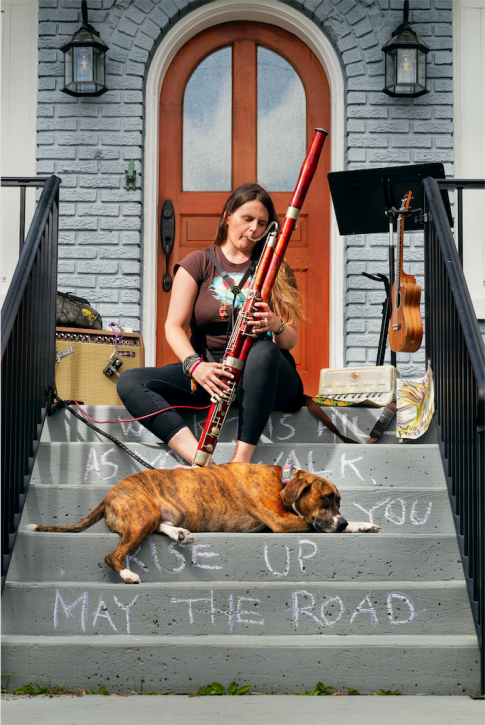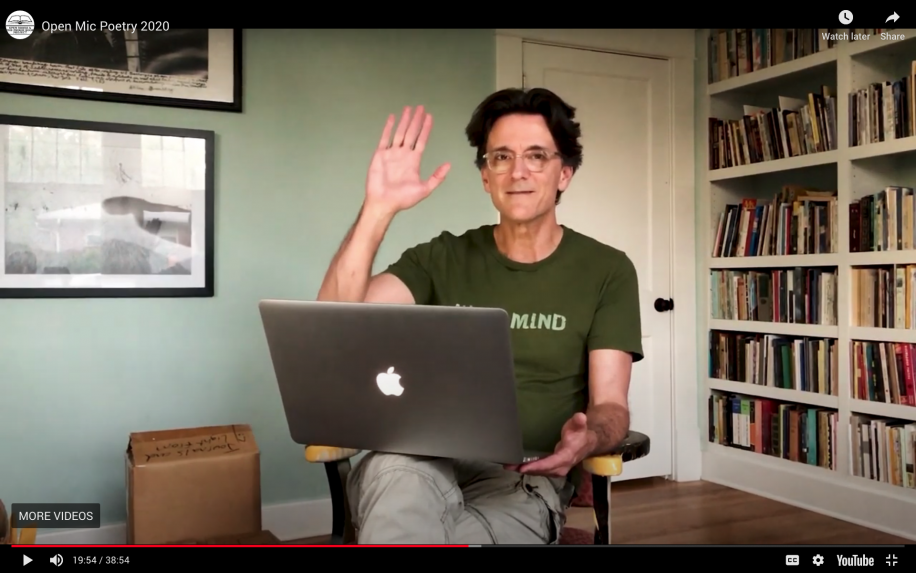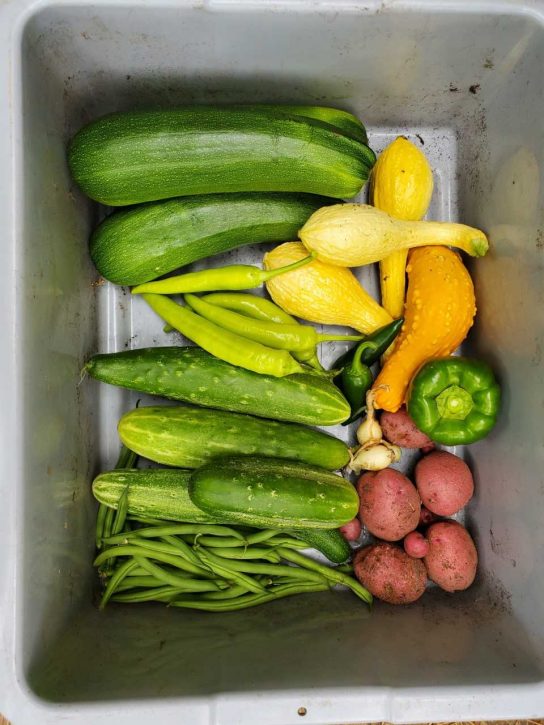By: Dakota Parks
When the entire world goes into lockdown, everyone suddenly has a lot of free time on their hands. Free time for some people might mean board games, puzzles, Netflix and snacks, but for others, it’s picking up a new hobby, planting a garden or starting a community-based project. Whether they’re meant for the community or just the fruit of someone’s labor, quarantine projects have started to flood the Internet as people share their DIY creativity. In an attempt to spread some positivity and joy amidst the panic and fear associated with COVID-19, we asked Pensacola to share with us what they’ve been doing with their free time, and Pensacola delivered. Here are just a few great projects people have been working on at home and within the community.

Abigail Walker is a lifelong musician, a music teacher at Creative Learning Academy, a prior adjunct professor at UWF and PSC and a bassoon player for the Pensacola Symphony Orchestra. She has played in the symphony since she was 14 years old, although she left for college and returned. With the majority of her concert season cancelled, Walker was walking through her neighborhood in East Hill with her children and her ukulele, when she realized that she wanted to bring music to her neighborhood. Armed with her bassoon and social media, Walker posted on the East Hill Facebook page and sparked what would become a neighborhood-wide network of quarantine porch concerts.
“We just moved to East Hill in November, and it’s an incredible neighborhood, but I hadn’t gotten to know my neighbors yet or how to even connect with them in the first place, and suddenly it’s a global pandemic,” Walker explained. “It’s funny because I have met so many people through these porch concerts and through the neighborhood social media, but I haven’t gotten to actually meet them in person. I still feel like I’ve gotten closer to my neighbors than I ever could have imagined.”
Neighbors would post their cross streets and what time they were playing and put on a concert for pedestrians walking, biking and jogging past. The first week after she posted about it, Walker said there were six or seven people playing music, singing and bringing out amps, keyboards, Trombones—a wide variety of genres and instruments. Suddenly people were sharing their artwork, books, even photos of gardens and trees.
“So many people see music as comfort and healing, and Pensacola has such a strong music community—especially our symphony,” Walker said. “Musicians train year-round for their concert season. Once, I got out on the porch, even with the kids interrupting me asking about Zoom or wanting their iPad back, I knew it was the space I needed to be in. I needed to be out there for myself, and I just wanted to spread that same comfort to other people.”

Christopher Satterwhite is a writer, UWF English professor, co-founder of Open Books & The Prison Book Project, as well as a co-founder for the 309 Punk Museum Project. Open Books is a non-profit, volunteer-run bookstore which supports the Prison Book Project. Since 2000, the Prison Book Project has been sending thousands of books to inmates in the Florida prison system. When Open Books made the decision to temporarily shut down for quarantine, they also knew their upcoming events and fundraisers would have to be cancelled. Through the power of social media and the collection of local poets, Satterwhite explained that they put together a virtual open mic to spread some creativity and showcase their organization on Patreon.
“All proceeds from the bookstore go towards paying postage to send books to people in prison, so with the bookstore being shut down, we’re trying to be creative. The virtual open mic was the best way we could be creative and be safe,” Satterwhite said. “We wanted to make the video because it’s a really depressing time for a lot of people. We also like to think of ourselves as a cultural center and believe that literature in its broadest terms is important for society and that poetry is the closest you can get to the heart. We just wanted to showcase the heart in all of us and give some people hope.”
As Satterwhite explained, prisoners can receive books from only publishers or booksellers, so they operate the program through Open Books and send around 600 books a month. With the low-cost operating expense, small donations go a really long way. It costs around $3 to send a package to a prisoner, which has around three books in it, so it equals out to a dollar per book.
“After 20 years of operating this program, that means we’ve been essentially building libraries within the prison system,” Satterwhite said. “Prison libraries tend to be underfunded, small and unreflective of the reading styles of inmates. For all the book lovers out there, that have encountered that one book that has changed their lives, imagine being in prison where you have no access to books—we’re trying to give them access and change their lives.”
Satterwhite explained that Open Books will need book donations and volunteers eventually, but until they catch up on letters, the best way to support them is through small donations. You can view the virtual poetry open mic and support Open Books at www.patreon.com/openbooks.
Painted Mural on N. Reus St.
Lauren Gund has lived in Pensacola for the past five and half years and works for the civil engineering firm Mott MacDonald. Gund has worked in graphic design and always considered herself a creative person—although not a painter. She wanted to do something to spread positivity in the community, and when she realized her backyard fence was the closest thing to a free billboard, she designed and painted the Everything Will Be Ok mural located on N. Reus St. across from Gulf Winds Credit Union. Although Gund set out to spread positivity during quarantine with her mural, she explained that the mural also became a commemoration for her mother that passed away unexpectedly two years ago.
“My mother was such a loving, caring and positive person. Her entire career was centered around helping people: working for the Department of Health, hospice, different health organizations—she was even a lawyer and a nurse— just kind of a badass,” Gund said. “She was always talking to people, even strangers—that used to make me uncomfortable when I was kid. She just had this impact on everyone she met.”
While Gund was painting the mural across two weekends, she quickly saw the community’s reaction, people stopping their cars in the street to talk to her, walking by every day to see the progress, taking photos. One woman even stopped to tell her she had just lost her job that day and needed to see that message.
“I was just trying to get the paint up there so people could see it, but I didn’t realize the actual process of painting would be such an incredible gift. I just met so many people. I was trying to give the community a gift; meanwhile, the community was giving me a gift—a very unexpected one,” Gund explained.

Mellissa Callaway moved to Pensacola in 2000 from Orlando. She works for Lakeview Center and started her own hand lettering business Scripted Calling at the end of 2018. She uses a Glowforge 3D laser cutter to engrave or cut materials either custom made or designed and sold on her Etsy shop. Callaway wanted to do something to help during the pandemic, and when Glowforge announced their Two Million Essential Ears Initiative, she began producing ear savers that are designed to alleviate the pain and soreness healthcare workers encounter when wearing masks for their entire 12-hour shifts.
“Most people are going stir crazy right now, but they have this overwhelming desire to help. As a Glowforge owner, this was my way to give back just a little bit,” Callaway said. “I kept seeing the commercials and videos of healthcare workers, and I could tell there was so much stress and pain being caused to their ears and faces from the masks that are supposed to protect them so they can protect us. I knew that if this is all I could do, then I was willing to do it.”
Callaway explained that the design is already prefabricated, but owners are adding their business logos to the ear savers to ensure they are sent through the proper donation channels. One sheet of material produces around 100 ear savers. The ear saver is placed on the back of the neck and holds both sides of the face mask to take stress off the worker’s ears. Callaway even sent some out as a trial run to her friends to make sure they really worked and received all positive feedback.
If you are a healthcare or an essential worker and want to receive free ear savers, visit forms.glowforge.com/request to fill out the request form and find a manufacturer near you.

Rebekah Snyder, rooftop technician for Audobon Florida, spends most of her time on the Panhandle shorelines and gravel rooftops working with state threatened birds that nest on the beaches and are often disturbed and destroyed by humans. While her job remained essential, she lost all volunteer help in the field resulting in her workload increasing. As a way to destress and settle into her new studio apartment near Bayou Grande, she built a raised planter box during quarantine.
“I grew up with a large family garden in Pennsylvania and made my first garden box in college. Since living here, I have missed that part of being back home: spending eight hours weeding a tomato patch, going out back to pick some fresh herbs for dinner,” Snyder said. “I wasn’t able to make anything like this at my old apartment in town, so after moving to my new place, I was excited to be able to build a garden box and get back to my hobbies. Gardening is very good for your mind and soul.”
Snyder said if she were to build another, she may research different options for wood and drainage, but she is happy with the product of her first solo project. She currently has zucchini, peppers, tomatoes, basil and cilantro growing.
“My box is 8’x2′ but I followed the same instructions available online as a square box. I also got a lot of advice from Elizabeth, the master gardener at From the Ground Up Community Garden,” Snyder explained. “She was able to talk me through my concerns about drainage, which plants are good to start with at what point in the season, soil differences, etc. The community garden is a great asset. She even told me I could save money and fill the box up with mulch and then use soil for the top area around the plants.”

Devin Michael Patrick, 23, is a Pensacola local and a seasonal traveler that has visited 36 countries and counting. He lives and works in the Pensacola area during the busy tourist season at various resorts and restaurants, then spends the off season traveling the globe. When the quarantine shutdowns resulted in him being laid off work, Patrick took the time to catch up on some reading and gardening.
“My grandmother had a big garden because they lived on five acres. She would grow gourds and then make crafts out of them. It was so cool—grandma growing her own arts and crafts— like using the garden to make something that could literally last forever,” Patrick said. “Unlike someone renting, I’m committed to this space, and it’s really special to me watching the transformation. I decided while I had the time I might as well double the size of the garden and try out some new varieties.”
After tilling the space for the garden and waiting for the last frost of the season, Patrick took to planting over 20 varieties of herbs, vegetables and fruit. He explained that he used seeds for the easy to grow plants like pumpkins, squash, and corn but purchased pre-packaged starters for the types he finds tough to sprout like peppers and watermelon. His advice for new gardeners is to start small and not get discouraged if plants die.
“If you just start with one plant and work up, then it just becomes natural because you spend time with your plants and learn how to take better care of them,” Patrick said. “I think that’s what makes it fun. Gardening is just about loving plants, spending time with your plants and tending to your plants. It’s not a big deal—you’re just doing it until it becomes second nature.”